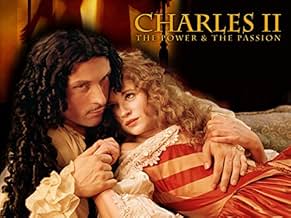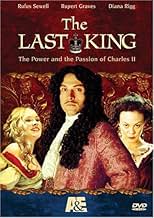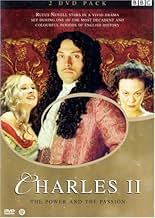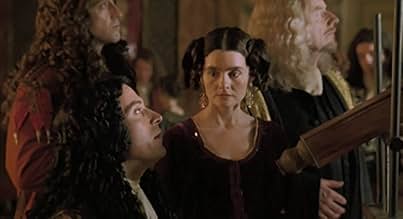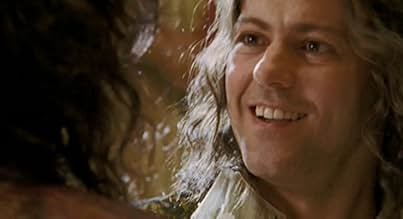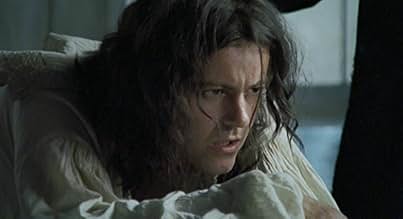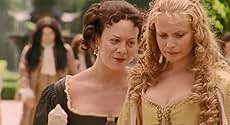IMDb RATING
7.5/10
1.9K
YOUR RATING
The chronicle of Charles II's time on the throne, his ten-year exile from Oliver Cromwell's England, and his triumphant return.The chronicle of Charles II's time on the throne, his ten-year exile from Oliver Cromwell's England, and his triumphant return.The chronicle of Charles II's time on the throne, his ten-year exile from Oliver Cromwell's England, and his triumphant return.
- Nominated for 1 Primetime Emmy
- 4 wins & 10 nominations total
Browse episodes
Featured reviews
Wow mark you could at least have come up with your own comment instead of ripping off comments from the newsnight discussion on the BBC web site. Did you watch it yourself or did you have someone do that for you as well? For myself I thought this was superb; well acted and scripted if a little prone to use audience capturing doses of sex (almost certainly included to justify it's Saturday night television slot rather than as any particular desire of the director).
The tracking shot at the end as they walk around the lake was especially well crafted and was for me the perfect way of ending the story as they chose to tell it.
The tracking shot at the end as they walk around the lake was especially well crafted and was for me the perfect way of ending the story as they chose to tell it.
King Charles II in comparison to other monarchs (primarily Henry VIII, Queen Victoria and Elizabeth I) is not a monarch that I know as much about. As someone who takes a great interest in history, kings and queens fascinated me from an early age, 'Charles II: The Power and the Passion' was an entertaining and riveting watch.
It is more than easy to see why it is so praised by many. At the same time, not everybody will be totally enamoured by it, especially those expecting rigid historical accuracy (something that 'Charles II: The Power and the Passion plays fast and loose with). Not everything about 'Charles II: The Power and the Passion' entirely worked for me. Narratively, it does feel jumpy in parts and time scales, events and dates are not always clear, a little narration or captions may have solved this a little without being too much of a documentary approach.
A couple of the characterisations felt a bit off, not the acting but the writing. It is agreed that Henrietta, despite being wonderfully played by Diana Rigg who has a blast with the role, is too vindictive and that her vengeful side is greatly exaggerated to sometimes pantomimic effect. It is further agreed also that Louise is made too clueless and the role is more annoying than charming.
Conversely, 'Charles II: The Power and the Passion' looks fantastic, beautifully photographed and richly and exquisitely designed costumes and scenery wise. The music is luscious and with energy and vibrancy without being intrusive or heavy-handed. All four episodes are very intelligently scripted, with little rambling and nothing feels too wordy with few of the characterisations ringing shallow too.
The story is not perfectly done, but is absorbing and makes one interested in knowing more about Charles and his life. The sexual element is played to the hilt, but done with taste, raw sensuality and passion, as is the rest of the storytelling. And there is nothing to fault the acting either. Rufus Sewell is just majestic in the title role and it has to rank up there with his best performances. Likewise with Rupert Graves as Buckingham. Helen McCrory is suitably cunning and Shirley Henderson really does touch the soul.
In summary, a riveting if imperfect series, definitely worth checking out as long as you take it for what it is and not a history lesson. 8/10 Bethany Cox
It is more than easy to see why it is so praised by many. At the same time, not everybody will be totally enamoured by it, especially those expecting rigid historical accuracy (something that 'Charles II: The Power and the Passion plays fast and loose with). Not everything about 'Charles II: The Power and the Passion' entirely worked for me. Narratively, it does feel jumpy in parts and time scales, events and dates are not always clear, a little narration or captions may have solved this a little without being too much of a documentary approach.
A couple of the characterisations felt a bit off, not the acting but the writing. It is agreed that Henrietta, despite being wonderfully played by Diana Rigg who has a blast with the role, is too vindictive and that her vengeful side is greatly exaggerated to sometimes pantomimic effect. It is further agreed also that Louise is made too clueless and the role is more annoying than charming.
Conversely, 'Charles II: The Power and the Passion' looks fantastic, beautifully photographed and richly and exquisitely designed costumes and scenery wise. The music is luscious and with energy and vibrancy without being intrusive or heavy-handed. All four episodes are very intelligently scripted, with little rambling and nothing feels too wordy with few of the characterisations ringing shallow too.
The story is not perfectly done, but is absorbing and makes one interested in knowing more about Charles and his life. The sexual element is played to the hilt, but done with taste, raw sensuality and passion, as is the rest of the storytelling. And there is nothing to fault the acting either. Rufus Sewell is just majestic in the title role and it has to rank up there with his best performances. Likewise with Rupert Graves as Buckingham. Helen McCrory is suitably cunning and Shirley Henderson really does touch the soul.
In summary, a riveting if imperfect series, definitely worth checking out as long as you take it for what it is and not a history lesson. 8/10 Bethany Cox
First, those of you who watched this as a three-hour movie with 30 commercial breaks must have seen a royally butchered cut as the R2 DVD is four hour-long episodes.
Second, those who claim that the BBC are not as good as they used to be are, perhaps, not quite fair, but not totally wrong either. I imagine they are comparing Charles II to Elizabeth R; I, Claudius; or The Six Wives of Henry VIII, and yes, it's not as good as they were. But then, neither were the other series the BBC were making at that time.
But if such comparisons are not entirely fair, they are also inevitable. Elizabeth, Six Wives and Claudius were televised plays. They worked due to the interaction of great scripts and great acting. The costumes were icing on the cake; the direction and camera work were capable but never drew attention to themselves. These teleplays continued a dramatic tradition traceable back to Shakespeare. They were *plays*.
Charles II, on the other hand, as well as other historical dramas done by the BBC these days, has abandoned its dramatic lineage for cinematic aspirations, especially as technology becomes more affordable. I don't consider this a bad thing, though I do think it failed, just as many teleplays of the golden era failed in their attempts. There's nothing wrong with bringing direction, camerawork, production design, etc. to the fore. Unfortunately, the scripts suffer, at least in this case. The viewer is innundated with flashy techniques like handheld cameras which achieve nothing other than making the show look modern, or a seven-minute long single take near the end of the final episode which contained about three minutes of dialogue that actually advanced the plot or developed the character in meaningful ways.
Is it worth watching? Yes. But don't compare it the greatest costume dramas ever made. Take it for what is, and it's a fine drama.
Second, those who claim that the BBC are not as good as they used to be are, perhaps, not quite fair, but not totally wrong either. I imagine they are comparing Charles II to Elizabeth R; I, Claudius; or The Six Wives of Henry VIII, and yes, it's not as good as they were. But then, neither were the other series the BBC were making at that time.
But if such comparisons are not entirely fair, they are also inevitable. Elizabeth, Six Wives and Claudius were televised plays. They worked due to the interaction of great scripts and great acting. The costumes were icing on the cake; the direction and camera work were capable but never drew attention to themselves. These teleplays continued a dramatic tradition traceable back to Shakespeare. They were *plays*.
Charles II, on the other hand, as well as other historical dramas done by the BBC these days, has abandoned its dramatic lineage for cinematic aspirations, especially as technology becomes more affordable. I don't consider this a bad thing, though I do think it failed, just as many teleplays of the golden era failed in their attempts. There's nothing wrong with bringing direction, camerawork, production design, etc. to the fore. Unfortunately, the scripts suffer, at least in this case. The viewer is innundated with flashy techniques like handheld cameras which achieve nothing other than making the show look modern, or a seven-minute long single take near the end of the final episode which contained about three minutes of dialogue that actually advanced the plot or developed the character in meaningful ways.
Is it worth watching? Yes. But don't compare it the greatest costume dramas ever made. Take it for what is, and it's a fine drama.
7=G=
"The Last King" is a 3 hour, two part miniseries from the BBC which traces the life of King Charles II who ruled from 1649 until his death in 1685. The upside of this film includes its sumptuous appointments and excellent cast. Well directed and crafted, the film is engaging, passionate, and delivers a strong sense of Charles II, his Monarchy, and the period. On the downside, however, the film is very difficult to follow given the absence of any prologue or didactics, the mixing of sir names and titles, and the presumption of some knowledge of the history of the time. The film squanders time on the sexual intrigues and personal relationships of the womanizing King while largely ignoring the more historical and profound matters of state. The Dutch Wars, for example, are barley mentioned while much time is spent on the machinations of one of his mistresses, Barbara Villiers making the film a bit more of a soap opera than a historical chronicle. Nonetheless, this elegant film is a must see for anyone interested in King Charles II and a should see for those into stories of the history of England's monarchy. No one does English period films better than the Brits and this one has production value equal to any similar films from Hollywood. (Note - the DVD I watched has no CC's or Subtitles with much dialogue spoken in whispers or thick English, French, of Portuguese accents). B
Charles II was the most unique king in English History. At the dawn of democracy, his father was executed by Puritan reformers in a great Civil War, and as a result young Charles had a misspent youth like that of any common criminal -- years on the run, a price on his head, living in taverns with low companions and learning to beg and borrow from other kings. Learning to disguise his emotions and trust in no-one, yet also learning to enjoy pleasure as the one sure comfort in life.
Rufus Sewell does an amazing job playing this complex, bitter, loving man, forever both sad and playful, the most notorious yet somehow most mysterious English king. The story covers all of his reign, from 1660 to 1685, and shows not only his relationships with his subjects, counselors, and family, but with the many passionate, demanding, and thoroughly bewitching royal mistresses who filled his days with glamor and amusement and his nights with excitement and pleasure. They range from the wickedly uninhibited, scheming and unscrupulous Barbara Villiers, to the cheerful, fun-loving Nell Gwynn, to the sweet and childlike Louise DeKeroualle. Last but not least, there is the king's own lawful wife, Catherine of Braganza, an extraordinarily resilient and caring woman who changes over the years from being a pitiful foreign outsider at the English court to being a beloved and respected companion of the king.
I have been reading about these fascinating historical personalities for years, and I have to say that by and large the movie captures all of them perfectly. There were moments so right they took my breath away -- the stupid, bigoted Duke of York flying into a religious tirade at the worst possible moment, for example. Or the weak-willed, feeble young Duke of Monmouth, Charles' doomed bastard son, being coaxed into the arms of Barbara Villiers one moment, and into treasonous plots the next, the handsome royal bastard no more than a fly caught in a web of pleasure and power. Or even the very brief scene of Charles' gentle and warm-hearted sister, trapped in a loveless marriage to a French nobleman, being consoled by the greatest king of all -- Louis XIV.
Of course, there were some interpretations I didn't like so much. Diana Rigg was wonderful as the king's fiery French mother, Henrietta Marie, but I think the writers exaggerate her vindictive, bitter attitude, and ignore her loyalty to her husband and son. In real life Henrietta Marie was not just a harpy shrieking for vengeance. She adored her son and took a very indulgent view of his pleasures at court. In her last years, the real Henrietta Marie was more likely to be found playing cards or going on shopping sprees or even indulging in love affairs with much younger men, rather than screaming for more executions and blood.
By the same token, the stunningly beautiful Melanie Thierry turns in an adorable performance as Madame Louise, Charles' passionate and very enthusiastic young French mistress. The real Louise was every bit as innocent and eager to bed King Charles as the film suggests. However young she was, however, Louise was no fool. She didn't need any coaching from the queen on how to look after the king. She made him so comfortable that she remained the favorite mistress until the day he died. Far from being a flighty scatterbrain, she was probably the most sensible and intelligent of the royal mistresses.
The film version ignores all this entirely, showing Louise as a clueless blonde with the mentality of a six year old. The real Louise was dark, with lustrous black hair and a pleasingly rounded figure that grew increasingly plump across the years. But it's most unlikely that Queen Catherine ever had to sit her down and lecture her on the right way to mother Charles. More likely it was the other way around, for the queen herself always referred to Louise as a "kind friend" and in fact often used to go to Louise for comfort and advice when she was feeling low and dejected in her later years.
In the last few years many saw Louise as almost something of a queen in her own right, able to dispense great wisdom while making the careers of many statesmen. When Charles was dying, she was the one who held his hand to the end (while Queen Catherine was rubbing his feet) and she also made sure he had a priest to confess to, since in his heart he had always been a loyal Catholic. It's a shame none of Louise's deeper shrewdness and strength comes across in the final segment of the film.
Yet on so many levels this movie is a masterpiece. THE POWER AND THE PASSSION tells the amazing true story of England's King Charles II with flair and style.
Rufus Sewell does an amazing job playing this complex, bitter, loving man, forever both sad and playful, the most notorious yet somehow most mysterious English king. The story covers all of his reign, from 1660 to 1685, and shows not only his relationships with his subjects, counselors, and family, but with the many passionate, demanding, and thoroughly bewitching royal mistresses who filled his days with glamor and amusement and his nights with excitement and pleasure. They range from the wickedly uninhibited, scheming and unscrupulous Barbara Villiers, to the cheerful, fun-loving Nell Gwynn, to the sweet and childlike Louise DeKeroualle. Last but not least, there is the king's own lawful wife, Catherine of Braganza, an extraordinarily resilient and caring woman who changes over the years from being a pitiful foreign outsider at the English court to being a beloved and respected companion of the king.
I have been reading about these fascinating historical personalities for years, and I have to say that by and large the movie captures all of them perfectly. There were moments so right they took my breath away -- the stupid, bigoted Duke of York flying into a religious tirade at the worst possible moment, for example. Or the weak-willed, feeble young Duke of Monmouth, Charles' doomed bastard son, being coaxed into the arms of Barbara Villiers one moment, and into treasonous plots the next, the handsome royal bastard no more than a fly caught in a web of pleasure and power. Or even the very brief scene of Charles' gentle and warm-hearted sister, trapped in a loveless marriage to a French nobleman, being consoled by the greatest king of all -- Louis XIV.
Of course, there were some interpretations I didn't like so much. Diana Rigg was wonderful as the king's fiery French mother, Henrietta Marie, but I think the writers exaggerate her vindictive, bitter attitude, and ignore her loyalty to her husband and son. In real life Henrietta Marie was not just a harpy shrieking for vengeance. She adored her son and took a very indulgent view of his pleasures at court. In her last years, the real Henrietta Marie was more likely to be found playing cards or going on shopping sprees or even indulging in love affairs with much younger men, rather than screaming for more executions and blood.
By the same token, the stunningly beautiful Melanie Thierry turns in an adorable performance as Madame Louise, Charles' passionate and very enthusiastic young French mistress. The real Louise was every bit as innocent and eager to bed King Charles as the film suggests. However young she was, however, Louise was no fool. She didn't need any coaching from the queen on how to look after the king. She made him so comfortable that she remained the favorite mistress until the day he died. Far from being a flighty scatterbrain, she was probably the most sensible and intelligent of the royal mistresses.
The film version ignores all this entirely, showing Louise as a clueless blonde with the mentality of a six year old. The real Louise was dark, with lustrous black hair and a pleasingly rounded figure that grew increasingly plump across the years. But it's most unlikely that Queen Catherine ever had to sit her down and lecture her on the right way to mother Charles. More likely it was the other way around, for the queen herself always referred to Louise as a "kind friend" and in fact often used to go to Louise for comfort and advice when she was feeling low and dejected in her later years.
In the last few years many saw Louise as almost something of a queen in her own right, able to dispense great wisdom while making the careers of many statesmen. When Charles was dying, she was the one who held his hand to the end (while Queen Catherine was rubbing his feet) and she also made sure he had a priest to confess to, since in his heart he had always been a loyal Catholic. It's a shame none of Louise's deeper shrewdness and strength comes across in the final segment of the film.
Yet on so many levels this movie is a masterpiece. THE POWER AND THE PASSSION tells the amazing true story of England's King Charles II with flair and style.
Did you know
- TriviaShirley Henderson's elaborate hairstyle for Catherine's arrival initially took two hours to create.
- GoofsJust before the sequence concerning the smallpox epidemic, we get a brief look at The King's upper right arm and can clearly see a smallpox vaccination scar.
- Quotes
Nell Gwynn: [after being mistaken for Charles' Catholic mistress Louise de Kéroualle] Good people, you are mistaken; I am the Protestant whore.
- Alternate versionsThe version shown in UK was titled "Charles II: The Power & The Passion" and its original running time is 235 minutes. It was broadcast on TV by BBC in four parts, as it is also on the UK DVD distributed by BBC. The longer UK version has also been released in many European countries (Finland, Netherlands and more) and Australia. The version shown in USA on A&E was titled "The Last King" and has a running time on 188 minutes, cutting it down by almost 40 minutes. The DVD released by A&E in USA is the shorter version.
- ConnectionsReferenced in The Making of 'Charles II' (2003)
- How many seasons does The Last King have?Powered by Alexa
Details
- Release date
- Countries of origin
- Official site
- Languages
- Also known as
- The Last King
- Filming locations
- Production companies
- See more company credits at IMDbPro
Contribute to this page
Suggest an edit or add missing content


